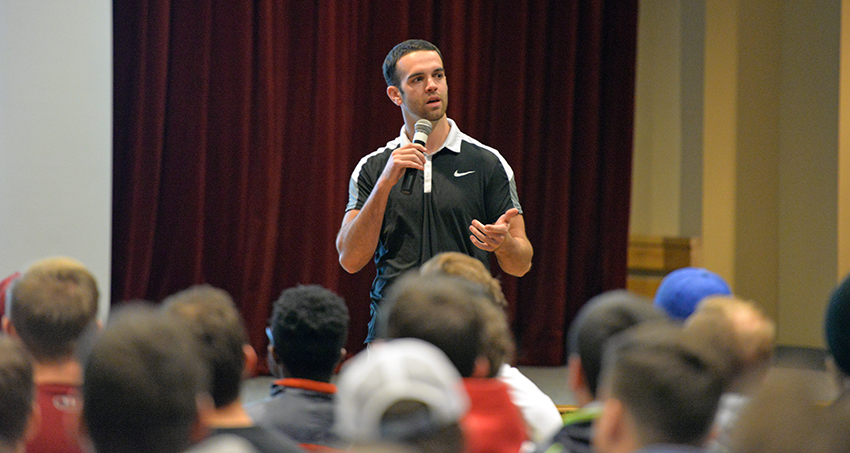When It Comes to Mental Health, It’s Important to Share Your Struggles
A student-athlete who graduated in 2014 returned to campus to speak to the current men’s teams about the depression and anxiety that surfaced during his senior year.By: Meghan Kita Monday, December 11, 2017 11:52 AM
 Andrew Onimus ’14 speaks to the men's sports teams on November 8. Photo by Cory Smith.
Andrew Onimus ’14 speaks to the men's sports teams on November 8. Photo by Cory Smith. The week before the first football game of his senior year, Andrew Onimus ’14, an accounting and finance major and a starting defensive back, suffered an injury: a hematoma on his lower back. He was able to play, but not at his full capacity. He didn’t feel like himself. Still, despite the athletic setback, he had one thing most college seniors covet: a full-time job lined up. With that stressor out of the picture, he wondered, why wasn’t he sleeping?
As Onimus, who was also captain of the men’s track team, recounted the downward spiral that began that semester during a speech to Muhlenberg’s men’s teams in the Seegers Union Event Space on November 8, he noted that insomnia was the first red flag. “I never had any mental health education,” he says later. As a speaker with Minding Your Mind, a Pennsylvania-based nonprofit that connects schools with young adults who can talk about their mental-health struggles, Onimus always shares how to know something’s wrong: If you’re in “a rut” for more than a couple weeks, if you’re losing interest in normal activities, if you experience a change in appetite, those are all signs you should seek help.
Onimus didn’t—at least not right away. After a few months in which he felt progressively worse, he got to the point where he was suicidal and in the emergency room. That’s when he learned he was suffering from depression and anxiety, and once he had a diagnosis, he could begin taking steps toward recovery. For him, that meant taking three months off.
“It took me so long to understand what was going on,” Onimus says. “I didn’t even know I needed help because I thought I would snap out of it. Once I reached out, it’s not like I got better right away, but at least I was in that recovery mode. It’s tough to stress that, because a lot of college students have a bunch of responsibilities they’re trying to get done in four years. They think, ‘I can’t miss even a day, let alone a week or a month.’ But I needed to. Sometimes you just need to take time to get your health back.”
Lily Otu, the assistant director of athletics for student athlete development, diversity & inclusion, invited Onimus (and another Minding Your Mind speaker, for the women’s teams) to campus after the athletes requested more information about mental health. She started her role in July, so she hadn’t known Onimus as a student. She reached out to Minding Your Mind after seeing another one of their speakers on ESPN, and while that individual wasn’t available, the organization let her know a Muhlenberg alumnus was on their roster.
“I thought it would be an awesome opportunity for someone to come back and talk about what they went through on this campus and the support they received from many people who are still here,” Otu says.
“I know how fortunate I was to have the support group I have,” Onimus adds, “not only my family, but the resources at Muhlenberg, too: my professors, the coaches, the training staff. The talk at Muhlenberg was probably my most emotional one yet.”
Nigel Long ‘18, a business major who’s a point guard on the basketball team, took away from the speech exactly what Onimus intended: that it’s not only okay to confide in your teammates and coaches when you’re struggling, it’s critical for your health and wellbeing, and it’s just as critical to be receptive to friends who might open up to you.
“Males tend to have a misconception that you can’t have emotion, you can’t be depressed,” Nigel says. “It was good to see somebody who has actually gone through it. Just because you’re this rugged football player, you can still have struggles emotionally. Not everybody is willing to open themselves up and talk about their problems, but it’s important to express yourself.”
Onimus, who balances his full-time job as an accountant with his speaking engagements, says sharing his story is one thing that helps keep him well. “I’ll do an assembly at a high school at 8 a.m. and I’ll see people napping like I would have done when I was a senior,” he says. “I start to think, ‘Is it really worth it?’ But afterwards, when someone comes up crying and saying thank you, I know it is.”
While he continues to have occasional bad days, he now has coping skills—like turning to one of his passions, physical activity—he can rely on. “For the most part, I’m like, ‘I have depression, I have anxiety, but I love life,’” he says. “I have a good job, an awesome family. The people who were there for me when I was crying, upset and hurting are laughing with me on weekends. I’m the happiest I’ve ever been.”
